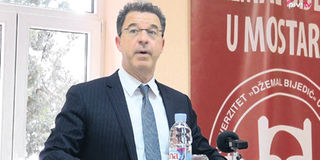Dar hailed for its role in hunting fugitives

The Mechanism for International Criminal Tribunal (MICT) prosecutor, Mr Serge Brammertz, during a past meeting. PHOTO |
What you need to know:
- MICT prosecutor Serge Brammertz, said here over the weekend, that besides hosting the United Nations facility, the country was keen to see those behind the horrific massacres are brought to book.
Arusha. The Mechanism for International Criminal Tribunal (MICT) has commended Tanzania’s efforts in the ongoing hunt for fugitives of the 1994 genocide in Rwanda.
MICT prosecutor Serge Brammertz, said here over the weekend, that besides hosting the United Nations facility, the country was keen to see those behind the horrific massacres are brought to book.
“We will ensure all the remaining suspects are apprehended and prosecuted,” he said during the official opening of the new premises for the tribunal, which took over the activities of the recently-disbanded UN International Criminal Tribunal for Rwanda (ICTR).
He added that at least six fugitive suspected to be the masterminds of the killings, in which over 800,000 people, mostly the Tutsi were hacked to death, were still on the run.
“Once apprehended they would be brought to Arusha to face the full wrath of the law,” he explained.
Mr Miguel Soares, a special representative of the UN secretary general sent to the event, said the tribunal was open to try other genocide fugitives from other flashpoints in Africa.
Vice President Samia Suluhu Hassan, who graced the opening of the $ 8.8 million (about 19 billion), said the new premises for MICT affirmed that Tanzania was committed to support the tribunal undertake its mission. The minister for for Foreign Affairs, Dr Augustine Mahiga, said the tribunal would be permanently stationed in Arusha.
Until recently, MICT was hosted at the Arusha International Conference Centre (AICC) here as was ICTR, which began its operations in the mid 1990s.
Since it started trials in 1997 until its closure in December, last year, ICTR had convicted 61 people and acquitted 14 others, of whom only six have found countries to host them because they feared returning to their home country, Rwanda, for fear of reprisals. Those who remain here are still homeless after being freed and are living in a “safe house” in Arusha. They are not allowed to travel out of the region because they don’t possess traveling documents.




